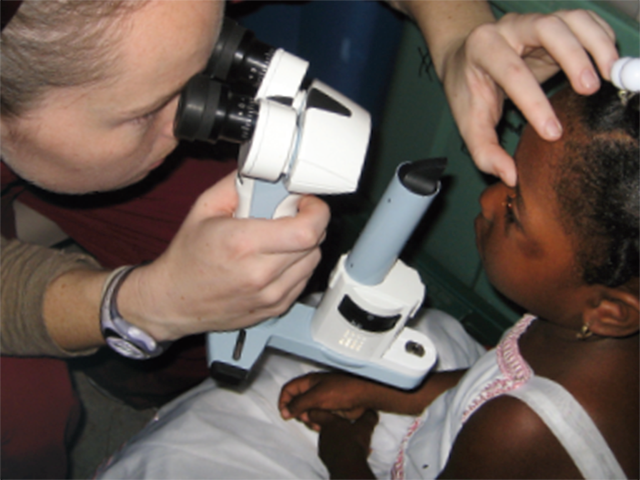Navigate Your Path to a Career in Optometry
Doctors of Optometry are the primary care doctors of the eye and the frontline protectors of vision—our most valued sense. As primary-care providers, doctors of optometry are educated, just as other physicians are, in general health and systemic disease. Optometrists are often the first to detect critical health issues—from diabetes to hypertension, from stroke to cancer—and refer their patients for timely treatment. Optometrists therefore enjoy the dual satisfaction of having the specialized knowledge to manage their patients’ eye health as well as the medical education to protect their overall wellness.
Completing a residency in optometry is a unique and valuable experience that can enhance career opportunities in different optometry practice areas such as ocular disease, pediatric optometry, vision therapy and brain injury rehabilitation Residencies are optional and are typically one year in duration and are located within hospitals, military facilities, outpatient clinics, or the clinical facilities of the various schools and colleges of optometry.

The profession of optometry involves much more than just prescribing and fitting glasses and contact lenses. ODs are viewed increasingly as primary care providers for patients seeking ocular or visual care. Learn more

For more information about the career of optometry and how to get into optometry school check out the FAQs section.
Only one degree qualifies you to become an optometrist: the Doctor of Optometry (OD), a four-year, doctoral-level degree. Aspiring optometrists should complete a bachelor’s degree and build a strong background in the sciences, preferably at a four-year college or university. The best candidates pursue pre-professional level science courses that are designed for science majors and health professions students and also must score well on a required standardized exam such as the Optometry Admission Test (OAT). Optometry school is demanding, and admission is competitive.

Optometry schools are looking for well-rounded candidates who have achieved not only in the classroom but also in other areas. Leadership ability, a disposition to serve others, and a work ethic characterized by dedication and persistence are just a few of the qualities that impress most admission committees. Watch now
Most schools consider an applicant’s exposure to optometry to be of vital importance. Applicants should become acquainted with at least one optometrist and gain some firsthand experience to see what optometrists do. Experience/exposure to the field is often a topic for discussion during the admissions interview. Listen now

Because each optometry school may have slightly different admissions criteria, it is strongly recommended that applicants contact all the schools and colleges to which they are interested in applying.
There are 24 schools and colleges of optometry in the United States and two in Canada.

The best advice to an applicant when selecting which institution to attend is to obtain information from the individual schools, talk to recent graduates, visit selected schools and ask pointed questions of faculty and students. Candidates should be most concerned with the academic rigor of a program, the clinical experience offered, and the availability of faculty and support services.

No valid ranking of optometry schools exists.
Use the Optometry Admissions Directory to search for optometry programs by entering other specific search criteria.

Each school and college of optometry has its own admissions requirements and prerequisites. Each applicant must apply through the OptomCAS centralized application service to be considered.
Apply early through OptomCAS. Never wait until application deadlines are approaching.
Truthfully represent yourself. Honesty is best regarding all aspects of your application, including the weaker areas.
Visit campus(es). Contact the schools you are interested in and try to visit each one and develop the personal relationship early in the admissions process.
Understand the admissions requirements. Create a spreadsheet or “cheat sheet” that includes all of the requirements for the Doctor of Optometry programs you’re considering.
Gain critical exposure. Gaining exposure to the optometric field can strengthen your application.
Ask questions. This is an exciting time of exploration and discovery, and the best way to gather information is to ask plenty of questions.
Follow up. Work with admissions to guide your application through the process.
Present your professional self. Once you are invited to a school to interview, present the best you by dressing professionally, and be prepared to ask questions about the school or college.
Decide which school is best for you. Make sure the schools or colleges of optometry you apply to are a good fit for you.

Take all your prerequisite courses, including a strong background in sciences and lab experience. Learn More

Find out the optometry requirements and take the OAT, GRE or other accepted standardized exams. Learn More

Apply to one of the 24 optometry schools and colleges in the U.S. Learn More













